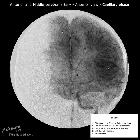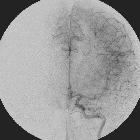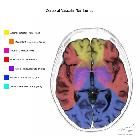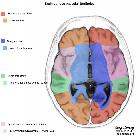anterior cerebral artery













The anterior cerebral artery (ACA) along with the middle cerebral artery (MCA) forms at the termination of the internal carotid artery (ICA). It is the smaller of the two, and arches anteromedially to pass anterior to the genu of the corpus callosum, dividing as it does so into its two major branches; pericallosal and callosomarginal arteries (see below).
It supplies the medial aspect of the cerebral hemispheres back to the parietal lobe.
Gross anatomy
Segments
The anterior cerebral artery is divided into five segments :
- A1: horizontal or pre-communicating segment
- originating from the terminal bifurcation of the ICA, extending ~14 mm in length
- terminates at the anterior communicating artery (ACOM)
- A2: vertical, post-communicating or infracallosal segment
- originating at the ACOM, extending anterior to the lamina terminalis and along the rostrum of the corpus callosum
- terminates either at the genu of the corpus callosum or at the origin of the callosomarginal artery
- A3: precallosal segment
- extends around the genu of the corpus callosum or distal to the origin of the callosomarginal artery
- terminates where the artery turns directly posterior above the corpus callosum
- A4: supracallosal segment
- above the body of the corpus callosum anterior to the plane of the coronal suture
- A5: postcallosal segment
- above the body of the corpus callosum posterior to the plane of the coronal suture
The pericallosal artery refers either to the distal part of the ACA starting from A2 (after the origin of the ACOM) or from A3 (defined after the origin of the callosomarginal artery). In the former case, the A2, A3, and A4-5 segments refer to proximal, middle, and distal segments of the pericallosal artery, respectively .
The A4 and A5 segments predominantly run along the callosal sulcus, but in a minority of cases run above that, medial to the cingulate gyrus.
Branches
There are two main branching patterns of the anterior cerebral artery. In the first, the A2 gives off the callosomarginal artery (which lies in the cingulate sulcus) and continues as the pericallosal artery. In this configuration, the terminal (cortical) branches are given off the callosomarginal artery.
In the second configuration, the callosomarginal is absent and the terminal branches arise directly from the pericallosal.
- A1
- A2
- A3
- pericallosal artery
- callosomarginal artery (runs in the cingulate sulcus)
Terminal (cortical) branches
Orbital branches, 2 or 3 in number, branch over the orbital surface of the frontal lobe supplying:
- olfactory cortex
- gyrus rectus
- medial orbital gyrus
They are named:
Frontal branches supply:
- corpus callosum (with the exception of the splenium)
- cingulate gyrus
- medial frontal gyrus
- paracentral lobule (as the branches reach over the vertex to supply a strip of cortex on the surface, they are responsible for supply to the lower limbs)
Parietal branches supply:
Central branches
Multiple small branches are given off proximally (A1, ACOM, proximal A2) supply:
- anterior perforated substance
- lamina terminalis
- rostrum of the corpus callosum
- septum pellucidum
- anterior part of the putamen
- head of the caudate nucleus
- anteromedial part of the anterior limb of the internal capsule
The latter two (head of caudate and adjacent part of the internal capsule) are supplied by the recurrent artery of Heubner and associated smaller perforating branches. It has its origin near the A1-ACOM-A2 junction and can arise from all three, although usually it is from the A2. It curves back on itself and is at risk from ACOM aneurysm clipping.
Variant anatomy
- ACA fenestration with a reported incidence of 0-4% of A1 segment fenestration
- azygos ACA: ACA territories supplied by a single A2 trunk; incidence of ~2% (range 0.2-4.0%)
- ACA trifurcation: three A2 segments; incidence of ~7.5% (range 2-13%)
- bihemispheric ACA: a hypoplastic A2 segment with contralateral A2 segment dominance supplying both ACA territories; incidence of ~4.5% (range 2-7%)
- A1 segment absence/hypoplasia, contralateral A1 segment dominance and supply to ipsilateral A2 segment by a large anterior communicating artery; 10% of individuals demonstrate hypoplasia of A1 segment using a diameter 1.5 mm or smaller
- duplication of A1
- two or three anterior communicating arteries
- asymmetry of A1 segment which is associated with ACA aneurysm
- persistent primitive olfactory artery
Siehe auch:
- Arteria carotis interna
- Arteria cerebri media
- Corpus callosum
- Putamen
- Arteria pericallosa
- azygote Arteria cerebri anterior
- Gefäßversorgung Gehirn
- Arteria communicans anterior
- Nucleus caudatus
- Heubner-Arterie
- akuter Infarkt im Anteriorstromgebiet
- infraoptic anterior cerebral artery
- A1 Segment
und weiter:
- Circulus Willisi
- neuroradiologisches Curriculum
- arterielle Versorgungsgebiete des Gehirns
- medial lenticulostriate arteries
- lateral lenticulostriate arteries
- doppelte Arteria cerebri media
- Karotis-T
- moyamoya staging (Susuki)
- Grenzzoneninfarkt
- akzessorische Arteria cerebri media
- anterior circulation acute infarct
- Arteria callosa mediana

 Assoziationen und Differentialdiagnosen zu Arteria cerebri anterior:
Assoziationen und Differentialdiagnosen zu Arteria cerebri anterior:




